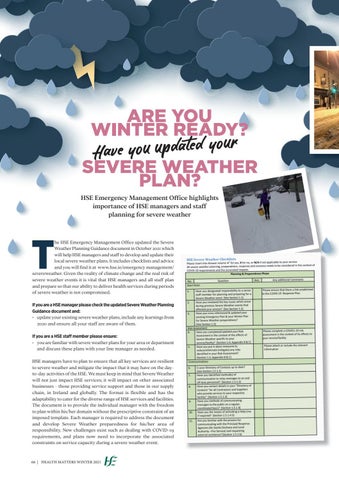ARE YOU WINTER READY? r u o y d te a d p u u o y Have SEVERE WEATHER PLAN? HSE Emergency Management Office highlights importance of HSE managers and staff planning for severe weather
T
he HSE Emergency Management Office updated the Severe Weather Planning Guidance document in October 2021 which will help HSE managers and staff to develop and update their local severe weather plans. It includes checklists and advice and you will find it at www.hse.ie/emergency management/ severeweather. Given the reality of climate change and the real risk of severe weather events it is vital that HSE managers and all staff plan and prepare so that our ability to deliver health services during periods of severe weather is not compromised. If you are a HSE manager please check the updated Severe Weather Planning Guidance document and:
• update your existing severe weather plans, include any learnings from 2020 and ensure all your staff are aware of them. If you are a HSE staff member please ensure:
• you are familiar with severe weather plans for your area or department and discuss these plans with your line manager as needed. HSE managers have to plan to ensure that all key services are resilient to severe weather and mitigate the impact that it may have on the dayto-day activities of the HSE. We must keep in mind that Severe Weather will not just impact HSE services; it will impact on other associated businesses - those providing service support and those in our supply chain, in Ireland and globally. The format is flexible and has the adaptability to cater for the diverse range of HSE services and facilities. The document is to provide the individual manager with the freedom to plan within his/her domain without the prescriptive constraint of an imposed template. Each manager is required to address the document and develop Severe Weather preparedness for his/her area of responsibility. New challenges exist such as dealing with COVID-19 requirements, and plans now need to incorporate the associated constraints on service capacity during a severe weather event.
66 | HEALTH MATTERS WINTER 2021
